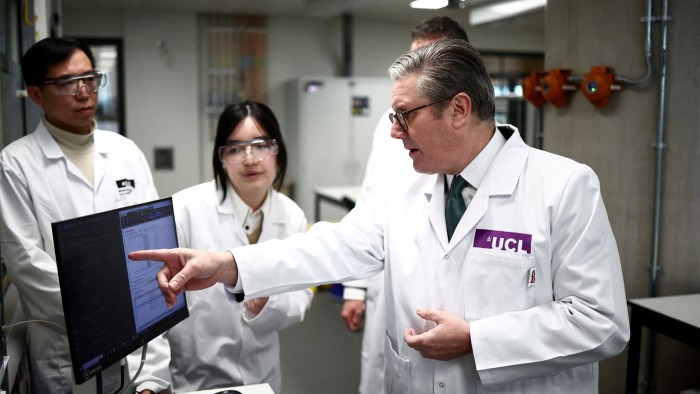Unlock the Editor’s Digest for free
Roula Khalaf, Editor of the FT, selects her favourite stories in this weekly newsletter.
It’s no bad thing that Britain is embracing artificial intelligence. Who wouldn’t want more technology that can diagnose cancer, fix potholes and nix credit card scams? Prime Minister Sir Keir Starmer’s grand scheme announced on Monday is thus helpful. But his goal of making the country a “world leader” demands more than servers, algorithms and enthusiasm.
The government’s plan to mainline AI into the nation’s veins comes in three parts. There’s building infrastructure, using AI to make the country economically zingier, and creating homegrown champions, which the plan characterises as becoming a “maker” rather than a “taker”.
The first part amounts to a kind of modest economic stimulus. In the US, data centres have impacted millions of jobs — although such facilities are not exactly labour intensive once up and running. Trade group Tech UK counted 43,500 British data centre jobs in a recent study. That could double in a decade, it estimated, but it’s still small.
Monetising Britain’s ‘intangible’ infrastructure, for instance by making the UK’s public data troves available for training large language models, is more valuable, provided privacy can be safeguarded, and already has some entrepreneurs salivating.
The second pillar of Starmer’s strategy — using AI — is a must-have. From the NHS to Britain’s banks and retailers, the opportunity to juice productivity by crunching data and generating faster outputs is huge.
Getting the private sector to co-operate presents a challenge. Previous governments played up AI’s risks, so companies will take time to adapt. The British Chambers of Commerce last year found that four in 10 companies had “no plans” to adopt any specific AI technology.
As always, the question lurks in the background: where is Britain’s Google? While the search engine’s AI sibling DeepMind is UK-born, and a leader in its field, there’s still no equivalent to OpenAI, Elon Musk’s xAI or Anthropic. When it comes to unlisted “unicorns” with valuations of more than $1bn, Britain does OK — but only OK. That speaks to Starmer’s third pledge.
Yet there’s no way to compete with America’s deep capital pools. Companies may take shape in the UK, but the US’s revenue, commercial talent and opportunities to take companies public are impossible to replicate. The UK’s biggest tech investment to date is the $1bn raised by autonomous driving company Wayve last year. By comparison, US-based OpenAI and xAI each raised $6bn in recent months.

That makes the idea of creating a homegrown OpenAI, Google, Facebook or Tesla far-fetched. Even becoming more maker than a taker looks ambitious. But trying to beat superpowers like China and the US at their own game is a recipe for misallocating capital — both financial and political. Half an AI hub is a better than none.
Source link









